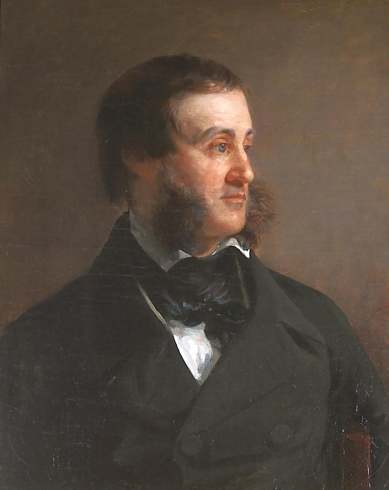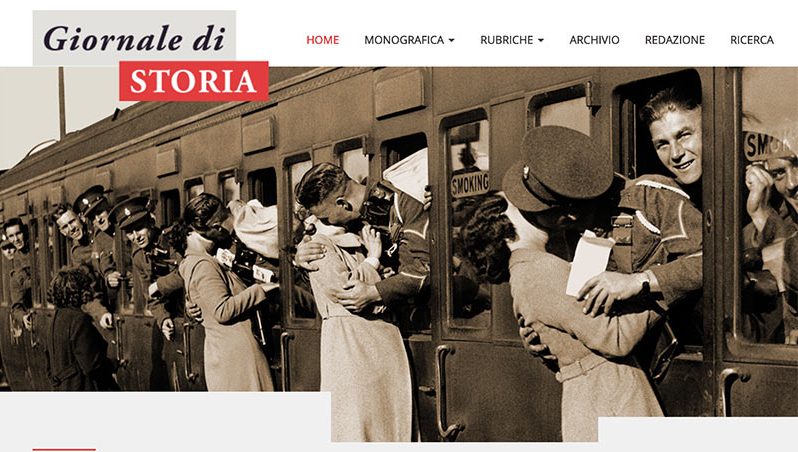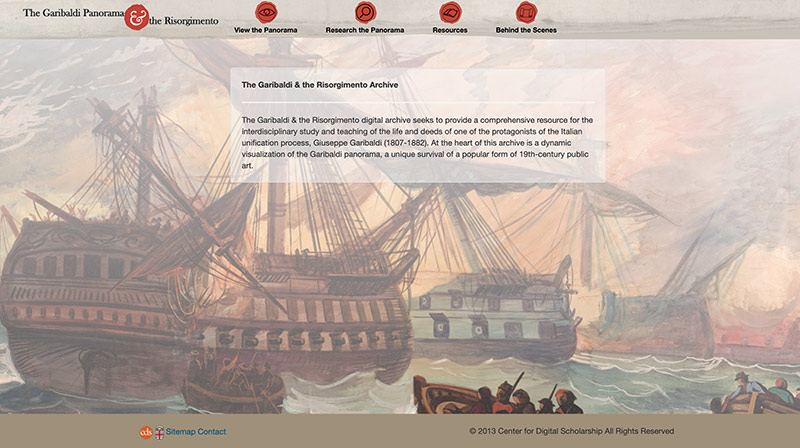1. The Revolution
James Buchanan, the U.S. secretary of state (and future president), informed Nicholas Brown of his appointment as U.S. consul to Rome in July, 1845. The fact that he spoke no Italian apparently was no bar.1A letter protesting the poor treatment he claimed he had suffered at the hands of Brown, written by an American in Rome who had initially served as Brown’s consular assistant, asserted that Brown spoke no language other than English (James Brent Clark to James Buchanan, Rome, January 28, 1847; Stock 1945, pp. 92-93). While it seems likely that Brown did not know Italian on his arrival in Rome, he almost certainly knew some French and in fact his archive contains letters by and to him in French. He arrived in Rome later in that year, but his first dispatch of any length to Buchanan came in April 1846 when he asked permission to absent himself from Rome during the months when, as he put it, it is “not considered healthy for foreigners to remain.” Brown interpreted the malaria season in a rather liberal manner, remaining absent from Rome from May through September.2Stock 1945, pp. 91-92 (Buchanan to Brown, July 26, 1845; Brown to Buchanan, Rome, December 22, 1845 and April 18, 1846). Stock’s 1945 volume, Consular Relations between the United States and the Papal States, contains the collected correspondence between Brown and the U.S. state department.
The new American consul did not feel it necessary to return to Rome when, on June 1, 1846, Pope Gregory XVI died. Few Romans lamented the passing of this reactionary pope, who had reigned for fifteen years, and fears of revolt aimed at ushering in secular, democratic rule were widespread. Hoping to find someone who could calm the people and preserve the theocratic government, the cardinals elected the 54-year-old bishop of Imola, Giovanni Mastai-Ferretti, who took the name of Pius IX.

Following his return to Rome in the fall, Brown’s initial report to secretary of state Buchanan reflected widespread enthusiasm for the man seen as the reforming pope: “Pius 9th is very popular with his subjects,” Brown wrote, “having granted a free pardon to all [political] prisoners & granted permission for railroads through his territories.”3Brown to Buchanan, Rome, Nov. 1, 1846 (Stock 1945, p. 92). Indeed, this enthusiasm was shared by President Polk who recommended that diplomatic relations be established with the Holy See. In March 1848 the U.S. Congress passed the necessary appropriations and a chargé d’affaires, Jacob Martin, was appointed to represent the U.S. in the papal court. Showing more enthusiasm for his job than Nicholas Brown—but less prudence—Martin arrived in Rome at the height of the malarial season in early August 1848. He was dead by the end of the month.4Rossi 1954, pp. 62-63; Liedekerke 1949, p. 100; Marraro 1944, pp. 489-494. As a result, over the following crucial months, only Nicholas Brown would represent the United States in Rome.
Yet, since his appointment, Brown had not felt it necessary to spend much more than the winter months in Rome, and had in 1846, 1847, and 1848 left Rome in April and returned only some time in the fall, leaving the consulate in 1847 and 1848 in the hands of a Frenchman resident in Rome, Antoine Ardisson.5Ardisson’s first reports to James Buchanan were written in French before—perhaps after being informed that English was required—switching to an imperfect English. Ar- disson sent fifteen reports to Buchanan from August 8 to November 28 of 1847, and then seven from April 3 to October 25 in 1848. Brown’s first report following his June 6, 1848 report was sent on December 12 of that year (Stock 1945), so he may not have been present in Rome at the time Rossi was assassinated and the pope fled the city. Pius IX’s slide from popular hero to villain took place with frightening speed. The Risorgimento was gathering force. Partisans of a modern Italian nation—at least many of the moderates among them—had hoped that the new pope could be the symbolic center around which Italians could unite and drive out the Austrians. The entire northeast of Italy was then part of the Austrian empire, which controlled much of the rest of the peninsula through marriages and alliances. Some dreamed of a federation of Italian states under the leadership of the pope himself.6Among the most influential of these proponents of Italian unification under the pope’s name was the priest-politician Vincenzo Gioberti (1843).
The patriotic fervor surrounding Pius IX suddenly dissolved when, in April, 1848, he declared that he could not support efforts to drive the Austrians out of Italy. Nor, he said, could he approve of a government of the Papal States that was under lay control, a key demand of the reformers. On November 15, insurgents murdered Pellegrino Rossi, the pope’s chief minister, in the middle of Rome, an assassin’s knife slicing through his neck. Thousands crowded into the piazza outside the pope’s Quirinal palace, aiming a canon at its gate, and demanding their choice of government.
Abandoned by his cardinals who fled for their lives, Pius IX found himself alone. A week later, with the aid of the Bavarian and French ambassadors, he slipped out the back door of his palace. Disguised as a simple priest he escaped to the fortress town of Gaeta, in the Kingdom of Naples. Events moved rapidly. The pope refused to meet with the delegation dispatched by the remaining government in Rome to urge him to return. In response the rebels called an election, based on universal (male) suffrage, to elect a Constituent Assembly to determine a new form of government for the Papal States. In early February the body gathered in Rome and on February 9, 1849, proclaimed the birth of the Roman Republic. The form of the government, the founding articles announced, would be “pure democracy.” 7Diurno, 1849, p. 3; Patuelli 1998, p. 44.
While Rome’s elite fled the city in horror, Nicholas Brown found the events intoxicating. On December 12—having returned to Rome, after months away, only following Rossi’s assassination and the pope’s escape, Brown sent a long report to James Buchanan. His rather flowery account of the murder of the pope’s chief minister showed remarkably little sympathy for his Italian colleague. “The sun of truth & liberty has risen on the horizon of Italy, & however the fogs of superstition, & the clouds of obscurantism may, for a while, hide its bright orb, yet shall its vivifying influence in time disperse them.” In referring to the assassination, he wrote: “The keystone of the arch of corruption thus removed, the edifice fell at once to the ground.” He painted a rosy picture of Rome in the wake of the pope’s departure, its people content, order maintained, and men of character at the helm of the government.8Brown to Buchanan, Rome, December 12, 1848 (Stock 1945, pp. 129-136). In mid-January 1849, the pope had sent a scathing protest to all of Rome’s foreign diplomats. Brown sent an English translation to Buchanan, with a cover letter. “In spite of the anile, tautologous prolixity of this extraordinary document,” explained Brown, “I have thought it better to transmit it entire … than to attempt an abridgement, which could hardly do justice to its imbecility.” He continued: “Comments upon its contents must even to the enlightened citizen of our great republic appear superfluous. The whole proceeds upon the assumption, hardly to be conceived in the nineteenth century, that the throne of this country, & the despotic rule over its three millions of inhabitants, is vested in the Papal Chair. But these absurdities are quite out of date.”9Brown to Buchanan, Rome, 16th Jan. 1849 (Stock 1945, pp. 141-145). Two weeks later, Brown reported enthusiastically to Buchanan on the results of the election for Rome’s Constituent Assembly. While the pope and his partisans were painting a picture of chaos and violence in Rome, Brown concluded his account with a starkly different view of life in Rome. “Order & peace,” he wrote, “never reigned more profoundly, within her ancient walls.”10Brown to Buchanan, Rome, Feb. 1, 1849 (Stock 1945, pp. 149-155).
All the foreign ambassadors to the Holy See had left Rome to join the pope in Gaeta, as the pope had demanded, but Brown stayed where he was.11As did several of the other consuls to Rome. No other nation recognized the legitimacy of the newly proclaimed Roman Republic, but Brown saw no need to await instructions from Washington. On February 5, the newly elected members of the Constituent Assembly marched through Rome to their new seat. “I thought it my duty, as an American citizen,” Brown informed Buchanan shortly afterward, “to do homage to the principle of popular sovereignty, of which our glorious republic is the living incarnation. Accordingly, I accompanied the splendid procession in my official uniform.” On the following Sunday, Brown participated in a special mass of thanksgiving organized by the Roman Republic leaders, held in St. Peter’s basilica at the Vatican.12In Brown’s description of the event, “in the presence of an immense concourse of people, all the deputies, public authorities, & a numerous body of civic guards and troops … thanks were offered up to Divine Providence, for the advent of the Republic. …” (Brown to Buchanan, Rome, 12th Feb. 1849, in Stock 1945, pp. 156-157). Brown’s papers contain a letter sent to him by the Ministero dell’Interno of the Roman Republic with two tickets for the gathering of the diplomatic corps at the Tribuna della sala dell’Assemblea Romana. Around the same time, in appointing Lewis Cass, Jr. to replace the deceased Jacob Martin as American chargé d’affaires in Rome, Buchanan explained the U.S. position: “although it has been the constant policy and practice of this Government to recognize existing Governments, without inquiring into their legitimacy; yet with this exception, that they shall have first afforded evidence of their will and their power to maintain their independence. This cannot yet be asserted in regard to the existing Government in Rome. Its recent origin and the almost insuperable difficulties by which it is surrounded, render it extremely doubtful whether it will be able to maintain itself.” Buchanan added: “Indeed I consider the speedy restoration of the Pope highly probably, if not absolutely certain” (Buchanan to Lewis Cass, Junr., 16th February 1849, in Buchanan 1909, p. 332).
Unable to contain his enthusiasm, Brown sent a letter on February 11 to the interim president of the Constituent Assembly, congratulating him on the proclamation of the Roman Republic and the end of papal rule. While, he wrote, he was not yet in a position to make any official statement on behalf of the U.S. government, he felt no “hesitation in stating to you that it has ever been a cardinal principle, uniformly, & under all circumstances, acted upon by the Govt. of the United States of America, to acknowledge, as supreme, any Govt. which a people may choose to institute. … So thoroughly known is this great truth,” he informed the leaders of the Roman Republic, “so deeply rooted in every American heart the love of liberty, that the nation will at once hail with joy the independence of the Roman Republic, long before their diplomatic agents have had time, in due official form, to give expression to the generous sentiments of their constituency.”13Nicholas Brown to Monsignor Muzzarelli, Rome, 11th Feb. 1849, American Consulate (Stock 1945, p. 158). A week later, Brown wrote to the foreign minister of the Roman Republic, Carlo Rusconi, expressing his enthusiasm for the newly proclaimed republic, and promising that the United States would quickly recognize the new government in Rome.14See Document #1 in the section “SELECTED DOCUMENTS FROM THE NICHOLAS BROWN PAPERS, JOHN HAY LIBRARY, BROWN UNIVERSITY”: Rusconi to Brown, February 18, 1849, Nicholas Brown papers, John Hay Library, Brown University (herein afterward referred to simply as: Nicholas Brown papers).
It is from these heady first days of the Roman Republic that we have one of the remarkable documents found in the John Hay archives at Brown, with Nicholas Brown’s papers: a note from Charles Bonaparte, one of the key figures in the Roman Republic, nephew of the French emperor and cousin of the newly elected president of France, Louis Napoleon. A prominent natural scientist, who had spent years living in the United States, he was the Roman Republic’s loudest rabble rouser, and vice president of the Constituent Assembly. Charles Napoleon wrote his note in English, accepting Brown’s invitation to a dinner honoring Washington’s birthday, February 22, 1849.
Ch. Bonaparte accepts with pleasure the Consul of the U.S.’s polite invitation at dinner at six o’clock on Thursday 22. anniversary of the
birth of
the first in war
the first in
peace
the first in the hearts of his countrymen
20 febr. 184915See Document #2 in the section “SELECTED DOCUMENTS FROM THE NICHOLAS BROWN PAPERS, JOHN HAY LIBRARY, BROWN UNIVERSITY”: Charles Bonaparte to Nicholas Brown, 20 February 1849, Nicholas Brown papers.
Yet amidst the excitement in Rome, some presentiment of impending doom began to spread. From his refuge in the fortress of Gaeta, the pope urged the Catholic powers of Europe to send their armies to restore him to power. On March 7, Brown lamented all that would be lost if the Roman Republic fell: the ending of the Inquisition and its prisons; freedom of the press; the placing of schools and universities under lay control. To exist as a temporal power, Brown explained in a report to the U.S. secretary of state, the papacy “must be a Theocracy, & thus radically different from any civilized government now established in the world.”16Brown to Buchanan, Rome, March 7, 1849, American Consulate (Stock 1945, pp. 162-165).
While Nicholas Brown’s public identification with the leaders of the Roman Republic and with the anti-papal cause was making him a popular figure in Rome, it was provoking increasing unease in Washington. To rein him in, in mid-February the president named a new envoy to the Papal States, filling the vacancy left several months earlier by Martin’s sudden death. Buchanan instructed the new chargé d’affaires, Lewis Cass, Jr., not to recognize the Roman Republic, which Buchanan was convinced would soon succumb to Europe’s invading armies.17Buchanan to Lewis Cass, Jr., Washington, February 16, 1849 (Stock 1933, pp. 17- 18).
Arriving in Rome on April 2, Cass began sending his own report to Washington.18These were addressed to the new secretary of state, John Clayton, who took office with the new presidency of Zachary Taylor. Clayton sent a circular to Brown on March 8, 1849, informing him of the appointment (Nicholas Brown papers). While his dispatches reflect his clear republican sentiments (his father had, the previous year been the unsuccessful Democratic Party candidate for President of the United States), Cass’s tone was dramatically different from Brown’s. Where Brown’s reports were filled praise for the great virtues of the Roman Republic and invective against the evils of theocracy, the new American chargé d’affaires offered a much more sober view. “Italy,” he observed, “is in a state of confusion and misery she has not witnessed since the middle ages.” In all likelihood, he predicted, Austrian troops would soon march south to restore the pope.19“There is now every probability,” Cass added, “that in the course of a month the Pontiff will be restored to the Vatican.” Cass to John M. Clayton, Legation of the United States, Rome, April 9, 1849 (Stock 1933, pp. 18-25). At the same time as Cass was sending Washington this report, Brown was participating in the latest prayer ceremony sponsored by the Roman Republic in St. Peter’s.20The invitation from the Ministro Sostituto degli Affari Esteri of the Roman Republic to Brown, dated April 7, 1849, inviting him to take part in the ceremony at 11 a.m. in St. Peter’s basilica, is found in the Nicholas Brown papers.
The contrast between Nicholas Brown’s panegyrics to the Roman Republic, and Cass’s more cautious reports to Washington became only more marked as events approached their bloody conclusion. On April 24, Brown received an urgent message from Alfred Lowe, the U.S. vice consul in Rome’s port city of Civitavecchia, containing dramatic news. General Charles Oudinot had just landed there with 1320 French troops. The next day Lowe sent a new message to Brown. Thirteen French war ships had arrived and thousands more French troops were disembarking. A French flag had been hoisted alongside the Roman Republic flag over the seaside fortress. On April 28, Lowe sent Brown the fateful news that thousands of these troops had begun moving out at 7 o’clock that morning and were said to be marching on Rome.21These three letters are all in the Nicolas Brown papers. Lowe, although U.S. vice consul in Civitavecchia, was British not American, and had taken up the post only four months earlier (Stock 1945, p. 129).
In the wake of this news, and the subsequent French assault on Rome, Brown sent a dramatic plea to Washington. The excuses given for not recognizing the legitimacy of the Roman Republic, he declared, were baseless. The “hopeless anarchy” that the clerical party was trumpeting, and its claim that there was little popular support for the republican cause, were mere calumnies. “Never truly did Rome see more calm, more order,” wrote Brown. “So much for that anarchy which has never existed but in the imaginations of frightened and fantastic dreamers, or in the reports of interested calumniators & mendacious hirelings.” The truth, urged Brown, was that the majority of Romans were “in favour of this govt. of self-government—of all those liberties so dear to every American. …” That the powerful French army was capable of conquering Rome for the pope, Brown acknowledged, was difficult to doubt. “But,” he added, “the hearts, the minds, the judgement of the Romans will still, in silence & secrecy … revere & cherish the memory of the lost Republic; as the fond mother, whose offspring has been massacred before her tearless eyes by the ruthless hand of the blood-stained barbarian, cherishes … her grief & her aspirations for revenge.”22Brown to Clayton, Rome, April 30th, 1849, American Consulate (Stock 1945, pp. 171-173).
Contrast this with Cass’s reports of the same time. With the French army preparing to march on Rome, he wrote on April 27, he could not imagine the Romans putting up any serious resistance. The Roman government, he wrote, “appears embarrassed, and undecided as to what course to pursue. This vacillation … has elicited from the people several riotous expressions of contempt and aversion.”23Cass to Clayton, Legation of the United States, Rome, April 27, 1849 (Stock 1933, pp. 32-34). Yet it was Brown whom subsequent events proved the more prescient, for in fact when the French army arrived at Rome on April 30 they were met with unexpected ferocity by the defenders of the Roman Republic, led by the swashbuckling Giuseppe Garibaldi. The French were sent into hasty, embarrassing retreat.




